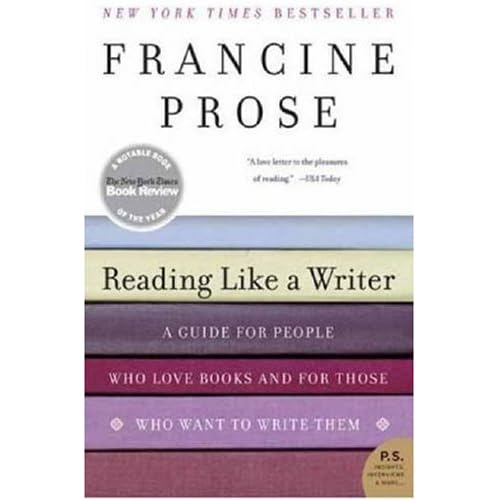
The book does perfectly what we've been trying to do in Reading into Writing. It does exactly what Solvejg has been telling me for years, thumping my literary endeavours into pulp over.
Jessica Murphy discusses the book with Francine Prose here.
So, why haven't I listened to Solvejg? Well, I have... I've just been ready to put it all into practise (there's still a lot of other errors in my prose to sort out). The other reason is that it's a big step. I've read your latest opening to Tethered Light, Solvey, and to tell you the truth, I'm awestruck. I will produce a more detailed report for you, but right now I'm reeling, because I'm not even in the same game, let alone league.
And the same goes for Prose's chosen extracts for analysis. Whilst I struggled through Sarah Waters's Night Watch, I began to lose hope in writing in general, but a book such as Reading into Writing, so beautiful by inclusion of the extracts, and so eye opening in its meaning really makes you fall in love with writing and literature. Just the sheer flow of some texts that I'd otherwise avoid (my wife and her English class had to do The Great Gatzby for A-Levels and hated it), but check this out:
The windows were ajar and gleaming white against the fresh grass outside that seemed to grow a little way into the house. A breeze blew through the room, blew curtains in at one end and out the other like pale flags, twisting them up toward the frosted wedding-cake of the ceiling, and then rippled over the wine-colored rug, making a shadow on it as wind does on the sea.Francine Prose says:
The only completely stationary object in the room was an enormous couch on which two young women were buoyed up as though upon an achored balloon. They were both in white, and their dresses were rippling and fluttering as if they had just been blown back after a short flight around the house. I must have stood for a few moments listening to the whip and snap of the curtains and the groan of a picture on the wall. Then there was a boom as Tom Buchanan shut the rear windows and the caught wind died out through the room, and the curtains and the rugs and the two young women ballooned slowly to the floor.
You could almost get a sense of the passage by sorting the words according to what part of speech they represent, the participles and verbs (gleaming, rippling, ballooned), the adjectives and adjectival phrases (the white windows and skirts, the fresh grass, the pale flags of the curtains, the frosted wedding cake of a ceiling), the nouns (the whip and snap of the curtains, the groan of the picture, the caught wind, the boom of the shut window).She says a whole lot more - really insightful stuff that I'm sure we could all pick up with no trouble if we weren't all hurriedly skim-reading to finish the book. Prose teaches us to read slowly (like I need any more encouragement to do that - I'd never finish a book), looking at specific word use, sentence us, paragraph use, character use, narrative use... etc.
I cannot recommend this book enough - and guaranteed, once I've got my course out the way, I'm going to have to go back and read it again and again.
1 comment:
I've never mentioned this before, but now seems a good moment:
Sunset Bickham was going on about a tutorial he gave. He had given this student a poor mark and the student was confused: 'How come you haven't taught us this stuff?'
Sunset sighed. Of course, he had been teaching this stuff repeatedly for the entire duration of the course. It was just that the student hadn't properly assimilated the information.
It's apparently a very common phenomenon, not least amongst would-be writers.
Anyhoo, as soon as I read of Sunset's frustrations, I immediately thought of you. I figured that you'd get this stuff if I kept hammering it in. It takes longer for some people than for others.
I'm very fortunate: I feel that everything I do is hopeless and could be so much better, and that's what drives me. If someone says 'That's not very good solvey,' you can be sure that I listen and go away and study and practise and improve. If I'm uncertain whether to use 'which' or 'that', I need to find out for sure.
:o)
Here's the really great news:
The overwhelming majority of would-bes aren't bothered about all this study nonsense. Crikey, I would get called 'pretentious' several times a week in my dying days at lwc.
So we're in the clear buddy!
Just keep at it.
I'll continue blogging and reading everything you do, and I'll keep hammering. It'll all work out soon enough.
Never be afraid of change - of changing your approach and your techniques. Try different things. Understand how the narrative changes if you do this, or that.
I now believe that all good writing comes from good decision-making.
As I edit my way through Tethered Light, and am reassessing the decisions I made; I am shaking my head and sighing and then stripping out the non-essential stuff, reordering the essential stuff for maximum effect, clarifying my intentions, upping the emotional content (using loads of nvc and subliminal stuff), and honing the descriptions.
Thanks for your encouragement ricardo: it keeps me going!
x
Post a Comment